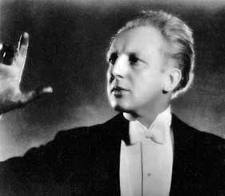Introducing something fun — posts every Monday with classical music surprises, often from our forgotten history.
Today, two orchestra tales.
 When Leopold Stokowski was music director of the Philadelphia Orchestra
When Leopold Stokowski was music director of the Philadelphia Orchestra
he somehow discovered that the Philadelphia police force had a motorcycle officer who was an expert xylophonist. So he invited him to a children’s concert and made him the centerpiece of a surprise charade. Stokowski himself opened the program with Mozart’s Marriage of Figaro Overture. But he played it at a mile-a-minute clip — so rapidly that the orchestra could hardly keep up with him. Just as it was ending, the motorcycle cop, in full uniform including helmet, goggles and black gloves, strode out on stage and firmly seized Stokowski’s elbow. “You’re going too fast,” he told him while the children gaped. “I’m giving you a ticket for speeding.” Stokowski, in the manner of most citizens in similar situations, attempted to talk his way out of it. The policeman finally offered to let him go in exchange for a chance to play with the orchestra. “What do you play?” asked Stokowski in pretended astonishment. “The xylophone,” said the cop. One was promptly wheeled out, off came the gloves and goggles, and The Flight of the Bumblebee resounded through the Academy — one of the most tumultuously acclaimed performances it ever had there. With events like these taking place, it was small wonder that adult Philadelphians tried to crowd into the children’s concerts — so much so, that a rule was adopted that grownups were not allowed unless they were chaperoning no fewer than ten children. Even at that, all sorts of ruses were attempted to gain entrance. One prominent Philadelphia couple attempted to get in my having the wife dress up in pumps and a short skirt, while the husband put on a false beard and passed himself off as her father. Some Philadelphians remember Stokowski’s children’s concerts more vividly than those they attended in later years.
[from Herbert Kupferberg, Those Fabulous Philadelphians: The Life and Times of a Great Orchestra, pp. 92-3. The xylophone stunt woud have happened in the 1920s or ’30s. Maybe more likely in the ’30s, when people drove more, and motorcycle cops were out on the road enforcing speed limits.]
And from Houston, during the second world war:
On one famous occasion at the urging of local sports writers and his own patriotic emotions, [Roy Cullen, the president of the Houston Symphony] allowed the orchestra to be used in conjunction with a professional wrestling match, as part of a war bond show. It was a grotesque spectacle, with the the orchestra sounding a dirge while the gory gladiators beat each other about in the ring. Unluckily the scene was recorded by a newsreel camera and the pictures created a scandal. What was not told was that this atrocity sold hundreds of thousands of dollars in war bonds.
[from Hubert Roussell, The Houston Symphony Orchetra, 1913-1971, p. 108n]
So our era didn’t invent the classical music showmanship that some people now think gives the field a band name. Hubert Rousell, of course, was outraged by the Houston stunt, and apparently others were, too. But it happened!
Those Philadelphia children’s concerts must have been jammed, if a rule of one adult to 10 children was even conceivable. And lots of adult concertgoers didn’t disdain the showmanship, didn’t ask whether it dumbed classical music dumb down.
[How that typo happened: I was getting new lenses put in my eyeglass frames, because I had a new prescription. Had to wait in Reihle Opticians in Warwick, NY (recommended, if you’re in the area) for almost two hours. Working on the blog post on my MacBook Air, without glasses. (Not recommended.)]

I love ‘dumbed classical music dumb’! Fabulous.
The power of typos! I fear I have to correct that, though…
Fantastic. Makes music real for the public. Have we learned anything yet?
What gave Stokowski power and license to take liberties was his fantastic talent and the best ears of any living musician. And his contemporaries said so. The only conductor I have found that was comparable to him was Sir Thomas Beecham.